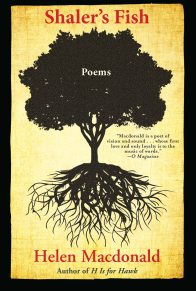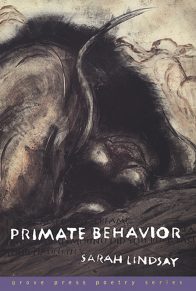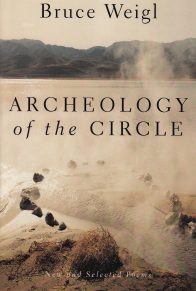Took root,
sent a finger between his teeth
that parted his jaws with its gradual thickness
and lifted its arms full of leaves that fed
on what was in his braincase
and mixed with the sky, and made
a sound in the wind that was
almost what he wanted.
Mount Clutter
One day when the planet was idly
pressing stegosaurs in her scrapbook,
she threw out a whole plateau
of souvenirs from the Ordovician, on impulse.
She’d long since run out of places to put things–
one reason these organelles are crammed into cells–
and naturally disorder breeds disorder:
you get distracted, you put down that scribbled
fossilized note about Martian microbes,
and once you set a tectonic plate on top of it,
you may never find it again. Though all kinds
of stuff will turn up while you’re looking.
It’s a realistic carelessness
that lets prize bones weather out of a cliff and crumble,
that shrugs when a secret cave on the coast,
with paintings of hands, great auks, and well-fed horses,
is sniffed out by the rough wet nose of the sea.
You can’t expect your mother to save
your comic books forever, much less
her dried corsages,
snakeskins, pinecones, yearbooks, report cards,
and all the photo albums
from her life before you, on the chance
you might take an interest someday.
Be glad there’s an attic, and a bunch of keys
that might fit something. Over here,
a sack of marbles she won off the neighbor boys, a sea-green
pillbox hat with a veil, a whole drawerful
of crinoids, a petrified forest, stromatolites . . . and here,
wrapped in the sports page from August third, 500 million b.c.,
it’s the Cambrian worm Insolicorypha psygma:
dozens of bristles, a head divided in two,
if that was indeed the head. Once common as pennies;
now this is the only one. Go on rummaging,
brushing off dust, though you may find later
that it was the dust you wanted.
What if you don’t find
the Missing Link, the Conclusive Proof
of that cherished hypothesis you cooked up
along with the instant soup on your hot plate
amid the books and shirts and notes and dishes?
Just see what she left you, without being asked:
opposable thumbs, cerebral cortex,
cuneiform, a recipe for piecrust,
and, in this shadowy corner, the rock itself,
prehistoric, prenotional Mount Clutter,
on which Occam’s razor, like your inherited pocketknife,
is repeatedly wrecked and whetted.
Copyright ” 2002 by Sarah Lindsay. Reprinted with permission from Grove Atlantic, Inc. All rights reserved.













